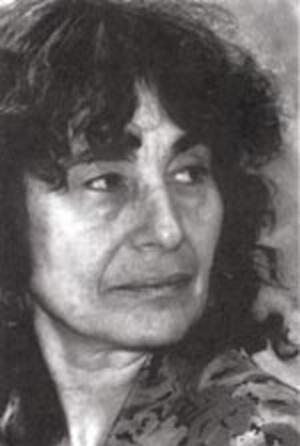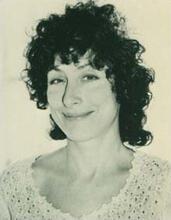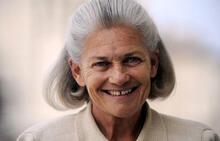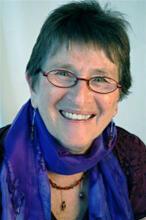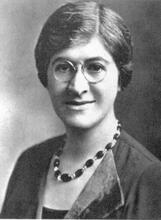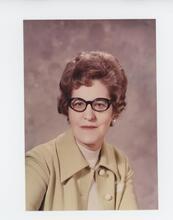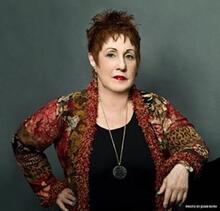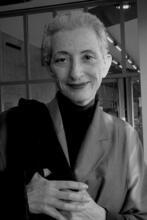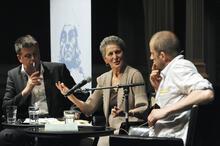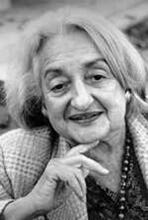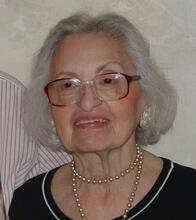Alicia Suskin Ostriker
Alicia Ostriker is a feminist revolutionary, a poet, critic, and creator of contemporary midrash. Her work often juxtaposed the personal and the political. Her 1986 groundbreaking book, Stealing the Language: The Emergence of Women’s Poetry in America, showed how women, from the beginning of writing poetry in America, were forced to deal with the prejudice and strictures of male-dominated criticism. Over decades, her poetry, which often incorporates midrashic components, has been an important touchstone of both the internal and external struggles and accomplishments of women in the twentieth and 21st centuries. Ostriker is one of an increasing number of women writers who have the courage to approach bibliocal history and legend from an unorthodox, feminist point of view.
Family & Education
Poet, critic, and creator of contemporary midrash Alicia Suskin Ostriker was born in New York City on November 11, 1937. Her father, David Suskin, was a playground director for the New York City Department of Parks. Her mother, Beatrice (Linnick) Suskin, was a folk dancer. She has one sister, Amy Meier, born in 1948. She received her B.A. from Brandeis University in 1955. In 1958, she married Jeremiah P. Ostriker, an astrophysicist; together they have three children: Rebecca (b. 1963), Eve (b. 1965), and Gabriel (b. 1970).
Ostriker received her M.A. and Ph.D. from the University of Wisconsin in 1961 and 1964, respectively. In 1965, she began to teach in the Rutgers University English department, where she is now a Professor Emerita. She has also taught poetry and creative writing at Brandeis University and Princeton University and has for many years led a midrash-writing workshop open to the public.
Feminist Scholarship
In order to understand Ostriker’s development, one must return to her early work on Blake. In her 1965 book, Vision and Verse in William Blake, and culminating in 1977 in her edition of The Complete Poems, Ostriker learned about Blake’s suspicion of authoritarianism as well as his liberating, imaginative vitality. The word “visionary” became a watchword of the highest order in Ostriker’s vocabulary.
Later, in A Woman Under the Surface (1982), Ostriker wrote about women in crisis, confronting both personal and political disaster. It is important to note the double meaning in the title. But this was not the first time she juxtaposed the personal and the political. In The Mother/Child Papers, she movingly juxtaposed the birth of her third child, a son, with the Vietnam War. In The Imaginary Lover (1986), she continued to write boldly about domesticity and marriage, but in “An Army of Lovers” and “Warning” she started to assert her Jewishness more personally: “She is like Abraham arguing with God ... / She wants everyone to escape.” In her 1983 book of critical essays, Writing Like a Woman, we see who her spiritual mothers are: H.D., Sylvia Plath, Anne Sexton, May Swenson, and Adrienne Rich. But she has gone a step beyond them, calling on her spiritual father, William Blake. Now, through a Jewish lens, she wants to contribute to tikkun olam, the healing of the world, through the restoration of the goddess in her many forms. Her survey of female roles in Jewish history in "A Meditation in Seven Days," in Green Age (1989) ends, "I am the woman, and about to enter."
As a feminist revolutionary, Ostriker has been in revolt since her 1986 groundbreaking book, Stealing the Language: The Emergence of Women’s Poetry in America, in which she showed how women, from the beginning of writing poetry in America, were forced to deal with the prejudice and strictures of male-dominated criticism. She went on to survey the complexity of contemporary women’s poetry by exploring divided identities, the body, anger and eros, and revisionist mythology. Eight years later, in The Nakedness of the Fathers, a spectacular fusion of poetry, memoir, criticism, and midrash that pushes against traditional genre boundaries, she extended her passionate inquiry to the situation of the Jewish woman, who for thousands of years has been denied her selfhood and forbidden to speculate about the meaning of biblical myth and legend. Neither book relies on vain complaint. Nakedness combines prose and poetry, memoir and midrash, retelling the ongoing stories of both men and women in the Bible, from Adam and Eve and the patriarchs and matriarchs, through Moses and David, Solomon and Sheba, and onward to Job's nameless wife, always with a personal—and political—spin. The book closes with a fantasy of a pregnant God and a prayer to the Shekhinah, who in kabbalah represents the feminine Divine. Thus Ostriker challenges the tradition, argues with it, and ultimately transforms it. Only a poet could have written The Nakedness of the Fathers, full as it is of passionate daring.
As in The Nakedness of the Fathers, in her overview for a new edition of the Five Scrolls of the Bible (2000) Ostriker engages the Bible as both a source and an object of her creativity. She writes that
to read Scripture with open eyes is to be amazed, again and again, by the clear light it casts on our own lives. The Bible is coolly realistic, achingly spiritual, psychologically acute, and brimming with practical wisdom for those with eyes to see and ears to hear. Nowhere is this more evident than with the Five Scrolls… And where else can we find such a feast of sensational storytelling and ravishing poetry? As the ancient sages say of Torah she-bi-khetav: Lit. "the written Torah." The Bible; the Pentateuch; Tanakh (the Pentateuch, Prophets and Hagiographia)Torah, so may we say of these books: turn them and turn them, for everything is in them. (The Five Scrolls… 2000)
Poetry
Returning to her early books of poetry, from the 1969 Songs to the sophistication of Green Age 20 years later, we can see Ostriker’s transformation from a poet of the quotidian to a poet of the sacred. In the poem “A Meditation in Seven Days” she writes, “Fearful, I see my hand on the latch / I am the woman, and about to enter.” While not a poet of the sacred in a conventional sense, Ostriker is intent on pushing against the boundaries that separate the sacred and the profane. She is concerned with the role of women in the context of the sacred as put forth by a long tradition of male sages and rabbis. While she may be “fearful” about entering the sacred texts of antiquity and claiming them as her own, she is intent on entering. She will enter.
Ostriker has published sixteen volumes of poetry. Her poetry, spanning decades, is an important touchstone of both the internal and external struggles and accomplishments of women in the twentieth and 21st centuries. In many instances, it incorporates midrashic components. In “Psalm,” (2001) for example, Ostriker writes, “I am not lyric any more / I will not play the harp / for your pleasure / I will not make a joyful / noise to you, neither will I lament / for I know you drink / lamentation, too, / like wine / so I dully repeat / you hurt me / I hate you / I pull my eyes away from the hills / I will not kill for you / I will never love you again / unless you ask me.” It would appear that that she is speaking through the lens of the biblical character David, and yet the rage and resistance of the poem’s voice, culminating surprisingly in a moment of openness and vulnerability, is distinctly contemporary. It is the voice of a woman who is outraged, but not so much that she has forgotten about the palpable force and necessity of love and desire. And it is the voice of someone who looks back at 20th-century catastrophes like the Holocaust and dares to hold God responsible for his silence.
Indeed, Ostriker’s work takes on the most challenging moral, ethical, and theological dilemmas of our time. Her 1980 feminist classic and anti-war poem sequence, The Mother/Child Papers, which was reprinted by the University of Pittsburgh Press in 2009, is a strong example of this engagement. Tackling the subject of motherhood before it was fashionable, Ostriker’s work in this collection fleshes out the idea that “the personal is the political” and demonstrates the ways in which military invasions of countries parallel medical invasions of women’s bodies. The Volcano Sequence (2002), a volume of spiritual quest and questioning, sees that wrestling with Jewish tradition is a burden but declares that “to put it down is forbidden.” Ostriker’s creative work is highly attentive to the injustices of the world, whether they are to be found in religion, politics, culture, or the domestic space. No Heaven (2005) is no exception, and whether she is writing about her mother, her husband, or Allen Ginsberg, Renaissance art, Israel, or the Iraq War, Ostriker resists dichotomies and reveals to us the depth and beauty of ambivalence. She offers us an image of the world that is, to borrow a line from “What is Needed After Food,” “so beautiful it cracks the bones.”
Honors & Legacy
Ostriker’s volumes Waiting for the Light (2017) and The Book of Seventy (2009) both won the National Jewish Book Award, and The Little Space (1998) and The Crack in Everything (1996) were finalists for the National Book Award. The Imaginary Lover (1986) earned Ostriker the William Carlos Williams Award. Ostriker was elected a Chancellor of the Academy of American Poets in 2015 and in 2018 was named the 11th New York State Poet by Governor Andrew M. Cuomo. Both her creative and her critical work demonstrate that her intellect is fierce and formidable but not inaccessible.
What does such a wide-ranging successful career have to tell us about Jewish studies? Ostriker is one of an increasing number of women writers who have the courage to approach biblical history and legend from an unorthodox, feminist point of view. This is not to say that Ostriker follows any path other than her own. Brought up in an assimilated household, regarding herself as an ex-atheist, she enters into every legendary life, both male and female, with a personal vision. Nothing received is sacrosanct; everything is subject to history and experience.
Selected Works
Critical and Scholarly Books
Vision and Verse in William Blake (1965).
The Complete Poems (1977).
William Blake: Writing Like a Woman (1983).
Stealing the Language: The Emergence of Women’s Poetry in America (1986).
The Bible and Feminist Revision: The Bucknell Lectures on Literary Theory (1993).
Dancing at the Devil’s Party: Essays on Poetry, Politics, and the Erotic (2000).
The Five Scrolls: The Song of Songs, The Book of Ruth, Lamentations, Ecclesiastes, The Book of Esther, preface by Alicia Ostriker, ed. by John F. Thornton (2000).
Poetry and Prose Poetry Books
Songs: A Book of Poems (1969).
Once More Out of Darkness and Other Poems (1974).
A Dream of Springtime: Poems 1970–78 (1979).
The Mother/Child Papers (1980); A Woman Under the Surface (1982).
The Imaginary Lover (1986).
Green Age (1989).
The Nakedness of the Fathers: Biblical Visions and Revisions (1994).
The Crack in Everything (1996).
The Little Space: Poems Selected and New, 1968-1998 in Pitt Poetry Series (1998).
The Volcano Sequence (2002).
She Took Off Her Wings and Shoes: Poems in the May Swenson Poetry Award Series, by Suzette Marie Bishop and Alicia Suskin Ostriker (2003).
No Heaven (2005).
The Book of Seventy (2009).
The Book of Life: Selected Jewish Poems 1979-2011.
The Old Woman, the Tulip, and the Dog (2014).
Waiting for the Light (2017).
The Volcano and After: Selected and New Poems 2002-2019 (2020).
Olidort, Shoshana. “’Yes, Women Poets Write About the Body’: A Conversation with Alicia Ostriker and Erika Meitner.” Los Angeles Review of Books, Sept. 12, 2019.
https://lareviewofbooks.org/article/yes-women-poets-write-body-conversation-alicia-ostriker-erika-meitner/
Osborne, Monica. “‘And What If I Say the Purposes Have Not Yet Been All Revealed?": Searching for Psyche and Reimagining God in the Poetry of Alicia Ostriker and Marge Piercy.” Studies in American Jewish Literature (1981-), vol. 25, 2006, pp. 77–84. JSTOR, www.jstor.org/stable/41206050.
Powell, Corey S. “PROFILE: JEREMIAH AND ALICIA OSTRIKER: A Marriage of Science and Art.” Scientific American, vol. 271, no. 3, 1994, pp. 28–31. JSTOR, www.jstor.org/stable/24942832. Accessed 11 Jan. 2021.
Smith, Martha Nell, and Julie R. Enszer, editors. Everywoman Her Own Theology: On the Poetry of Alicia Suskin Ostriker. University of Michigan Press, 2018. JSTOR, www.jstor.org/stable/10.3998/mpub.9958391. Accessed 11 Jan. 2021.
Copy
Alicia Ostriker Papers 1956-2015 Princeton University Library Special Collections
https://library.princeton.edu/special-collections/collections/alicia-ostriker-papers

